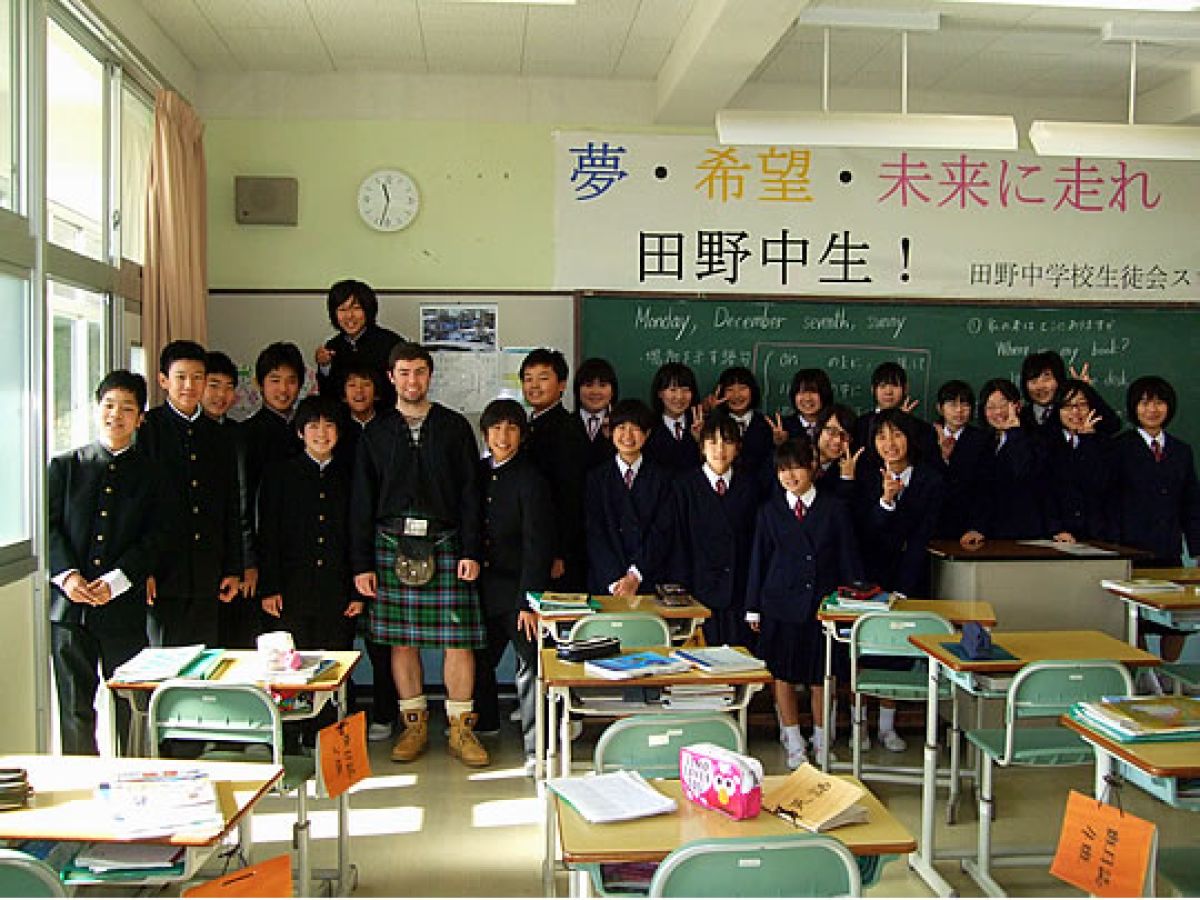
My name is Craig Hunter and I am a 25 year old Scotsman. I come from a town just south of Glasgow called East Kilbride. I currently live in a small town on the east coast of Kochi, Japan. It just so happens to be the most rural area of the most rural prefecture on the most rural island of mainland J
My name is Craig Hunter and I am a 25 year old Scotsman. I come from a town just south of Glasgow called East Kilbride. I currently live in a small town on the east coast of Kochi, Japan. It just so happens to be the most rural area of the most rural prefecture on the most rural island of mainland Japan.
When and how did you decide to move to Japan? Is it complicated to settle down there?
Japanese people often ask me why I decided to come and live in Japan. I think they are expecting an answer that describes my childhood love of Japanese culture, cuisine and anime. However, I often leave them disappointed by honestly telling them that I just wanted to live in a foreign country and Japan just so happened to be the first opportunity that came along. I was in my last year of University and began to panic about future employment when I stumbled across a presentation for the Japan Teaching and Exchange Programme (JET). I applied without much knowledge of the country other than what I had hastily asked my Japanese flatmate in the previous few weeks. I had an interview at the Japanese Consulate in Edinburgh and found myself placed amongst the rice fields a few months later. That was back in 2007 and I am currently coming to the end of my fourth and final year as an English teacher.
The JET Programme is a government initiative and so it is exceptionally good at helping participants move and adapt to life in Japan. However, I think it would be a lot more difficult for an individual with no Japanese to move and settle here. There is a lot of paperwork involved with visas as well as trying to organise the basics of accommodation, utilities, bank accounts and health insurance. It is certainly possible with those with perseverance, patience and some savings. I settled into my life here very easily but that was due in part to the kindness of those around me at the time.
Have you ever lived abroad before? How many countries have you visited?
No, this is the first time I have lived abroad. I have always wanted to do so but I often assumed it would be somewhere closer to home like Germany or Spain. I have visited about 15-20 countries but the majority of them were in Europe. Living in Japan has made it exceptionally convenient to visit places like South Korea, Thailand, Laos and Australia.
What do you like the most about Japan?
The prefecture I live in has beautiful scenery and weather. I live in a town that is squeezed in between the mountains and the ocean. I believe it receives the most hours of sunshine in Japan. I greatly appreciate this as Scotland is a very cloudy and rainy country. I like the general attitude of Japanese people as they are always friendly, respectful to one another and have a strong sense of family/community. They certainly never complain and whinge about things like I do on my blog. Also, I feel exceptionally safe and do not miss the violent city centres that Scotland witnesses on weekend evenings. The public toilets in this country are spotless as well.
How is / was the cultural shock? What are the main differences with your home country?
The culture shock of living in Japan can be quite severe at times and it can be especially stressful if you are the only foreigner in your countryside town. I have coped fairly well it during my time here but I found the first year quite difficult at times. I suppose the main difference that becomes apparent is that Japanese people are not very direct or confrontational. This means you need to find a new way to communicate with colleagues and friends and that can become quite frustrating. It's important to be patient and control your temper as you'll just look like an ignorant fool if you don't. Also, whilst Japanese people are not openly racist, they can be mildly xenophobic at times. A lot of the people here see the world as merely Japanese versus foreigners (called gaijin). It can become tiring and insulting when you are constantly made out to be different or are dismissed and not taken seriously in some matters.
Do you miss anything from your homeland?
The only time I really become homesick are on Sundays. I really miss walking to the shop to buy an English newspaper before eating an unhealthy breakfast consisting of sausages, bacon, black pudding, potato scones and beans. I miss going to the pub to watch football with friends as well as visiting my parent's house for a talk and Sunday dinner. Also, I miss talking in my natural accent and the never ending evenings of a Scottish summer. I forgot to mention cheese. Everyone here misses cheese.
Any 'memories of an expat' you would like to share with other expat blog members?
It is quite hard to select a memory that stands out for any particular reason. The first one that pops into my head is an evening when I was heading home from work and was stopped by an old man. He was very stereotypical of the elderly demographic here and I thought he was going to shout at me for doing something wrong. However, he demanded that we drink together and proceeded to bring round beer, whisky and Japanese vodka (shochu) to my house. An American friend joined us and the three of us got very drunk throughout the course of the evening. We struggled to communicate at times but it was an enjoyable evening despite the differences in age and culture. He said we were the first foreigners he had ever met and that he felt guilty for his previous attitude towards gaijin over the years. I haven't spoke to him since but we give each other a friendly wave when he passes me in his old truck.
How did you live the recent catastrophe which happened in Japan? What has changed in the country and for you since then?
I live quite far away from the Tohoku region but my prefecture had a major tsunami warning for two or three days. I actually left my house and went to higher ground with some other locals before the initial threat of tsunami had been called off. The international media have been exceptionally guilty of sensationalism in regards to the coverage of the Fukushima nuclear power plant. The majority of Japanese people has paid little attention to this threat and is instead focused on the humanitarian crisis. I have a lot of respect for the way the nation has dealt with the disaster and the resilience and calm that the Japanese people have shown. I donated over half my wages last month and I'm considering going to volunteer in the summer when my job finishes.
hen did you start your blog? For what reasons?
I started my blog just before I left for Japan in July 2007. I initially began writing as a means to keep friends and family at home informed without needing to send a lot of emails. However, I've taken the writing on as a hobby in recent years and tend to focus more on some Japan related material that people may find interesting rather than just writing about myself.
Did you make new friends with your blog?
I have begun following some other people's blogs (usually Japan related) who have commented on mine. I have never met any of them in person but it's nice to read about the experiences of others. It's interesting that numerous people who have moved to Kochi in Japan have stumbled across my blog before they came over. It tends to lead to an interesting yet awkward conversation when I meet them for the first time. I met an English girl just last week who said she had been reading and was quite surprised to meet me. They usually have nice things to say about it... thankfully.
When did you register on expat-blog? Any particular reasons?
I think I only registered on the site about 6-7 months ago. I bought a web address and changed the look of my blog. I guess I wanted to make it more professional and so looked at ways to promote it further. Expat-blog was one of the first sites I came across and I have enjoyed finding other blogs through it.
Which advice would you give to people who would like to live in Japan?
There is plenty of work available in English teaching and recruitment but you will struggle to find anything else unless you speak fluent Japanese or are employed with a foreign company. As for everyday life... I'd say that Japan is a great and often easy country to live in but there are times when it can be lonely and frustrating. I'd advise people to think about why they want to live here. I often find people who have the manga/anime fantasy view of the country but the reality can be different. I think you need to be able to learn to adapt, to be patient, to be open-minded and remember that you are ultimately a guest in a rather homogeneous country. If you are able to survive the initial few months of change and pick up some of the language then you'll have survived the most difficult period and the rest of your time here should be fairly easy in comparison.



















